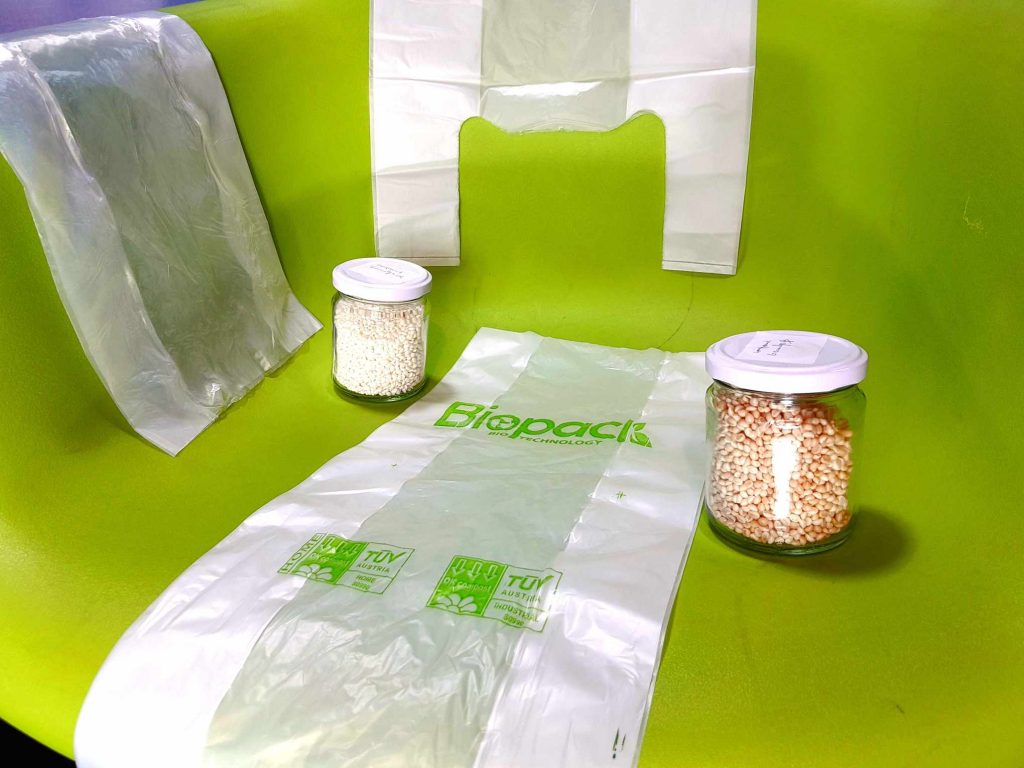BioPack: Tunisian Pioneer of Bioplastics on the International Stage
The Tunisian company BioPack, a subsidiary of the 3S technology group, stands out as a key player in the field of environmentally friendly materials. A BioTech startup with a capital of 30 million TND, specialized in the production of 100% biodegradable and compostable bioplastic granules, it positions itself as a model of sustainable innovation, combining local expertise with ecological commitment. Led by Nour Guetif, a young doctoral chemist, BioPack is located in the Zaghouan region and aims to assert itself as a major player in the international bioplastics industry.
Tunisian Solutions for a Greener Future
BioPack is the first and only company in Africa to produce bioplastic compounds. The exclusive formulations developed by BioPack are used to manufacture various types of biodegradable packaging, including shopping bags, fruit and vegetable pouches, bioplastic trash bags, and agricultural mulch films. The innovation lies in the fact that these products decompose naturally within months after use, unlike conventional plastics, which take over 400 years to break down while guaranteeing mechanical properties on par with ordinary plastic.
“We have developed two types of compounds: Germalys Alpha, made from PLA (polylactic acid), and Germalys Beta, made from corn starch,” explains Nour Guetif. Germalys Alpha is a compound with exceptional transparency that offers high mechanical resistance even for ultra-thin thicknesses of up to 10 microns, making it ideal for producing thin and robust bioplastic bags. Germalys Beta, on the other hand, stands out for its cost competitiveness while maintaining good mechanical properties and is particularly suited for mulch film that no longer needs to be removed from the soil to prevent plastic pollution. These formulations, entirely designed, patented, and manufactured by BioPack in Tunisia, confer on the company and Tunisia a leading regional position.
Significant Environmental Impact
The biodegradable plastic produced by BioPack does not simply disappear after use; it transforms into compost, thus contributing to nourishing the soil. This process, which takes between 9 and 12 months depending on the bag’s thickness, minimizes waste and reduces the ecological footprint. “It’s a double impact: not only do our products decompose quickly, but they are also partially bio-sourced,” adds Guetif. Bio-sourcing refers to the use of renewable resources, such as corn starch, in bioplastic production, thereby reducing dependence on fossil materials.
A Thriving Market
Biopack, certified by the international organization TUV, is distinguished by its exceptional mechanical properties and competitive approach. Although the Tunisian market is still poorly regulated in terms of obligations regarding the use of biodegradable plastics, BioPack has managed to assert itself internationally, notably thanks to stricter legislation abroad mandating the use of biodegradable bags. “The international market is currently more dynamic because laws require the use of these eco-friendly products, whereas in Tunisia, the guidelines are not yet mandatory,” emphasizes the director of BioPack.
A Promising Future
The company, 100% Tunisian and fully export-oriented, a subsidiary of the 3S group, continues to adapt to the highly fluctuating needs of the international market by developing new, more sustainable molecules for the future. With the increase in international demand for more environmentally friendly materials, BioPack is well-positioned to become an essential leader in the bioplastics sector first in Europe and then in Africa, as legislation evolves. Thanks to its local expertise, quality certification, and ecological commitment, BioPack demonstrates that Tunisia can play a key role in the global transition towards greener and more sustainable solutions.
The 3S group is not new to the world of “CleanTech” and “Zero Carbon.” Its subsidiary Sky Industrie is a leader in Tunisia in LED lighting under the CandyLed brand, a technology that reduces electricity consumption by tenfold and produces intelligent public lighting relying on the IoT network deployed by GlobalNet, another subsidiary of the 3S group and by Tunisia Telecom.
Finally, its subsidiary Africa Solar has quickly risen to the top rank of national photovoltaic integrators, especially for the self-consumption of industrial companies by providing them with on-frame or ground-mounted power plants.

